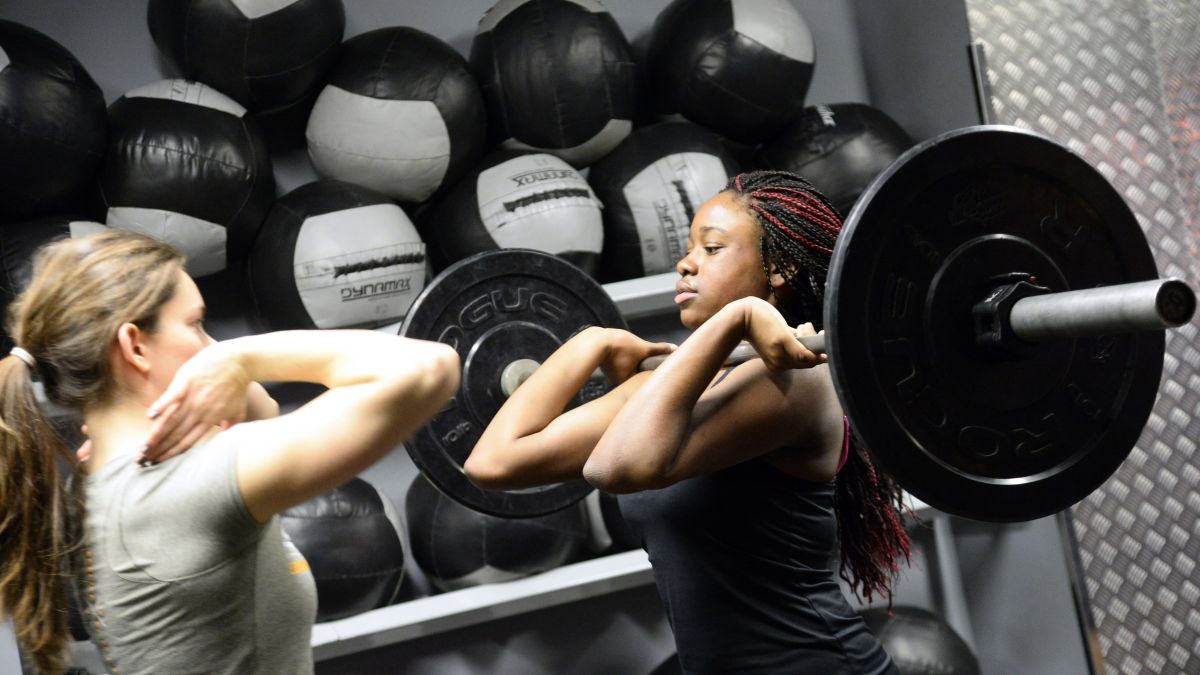1. Are you cutting calories?
To lose weight, you need to burn more calories than you're taking in. (Need proof? Here are six reasons you can't out-exercise a bad diet.) But there's cutting calories and then there's cutting too many calories, says registered dietitian and strength coach Marie Spano, RD, CSSD, CSCS. When you start slashing calories like a ninja, you might not be giving yourself enough fuel to really hit it during your workouts. "You just go through the motions," she says. Plus, many people who start off their days severely restricting calories end up throwing caloric caution to the wind by dinnertime. "If you don't have enough food, you're likely to encounter sugar cravings later in the day," says Washington D.C.-based registered dietitian Anne Mauney, MPH, RD.
The fix: Exactly how many calories you need depends on how many you're burning in the gym, but in general, your caloric deficit (the number of calories you eat minus the number of calories you burn) shouldn't be any more than 500 per day, Spano says. (You can use one of these cool tracking apps to help you keep tabs.) Aim to consume the bulk of your calories during the first half of your day and around your workout.
2. Do you follow up your workouts with a store-bought smoothie?
Hitting up the smoothie counter might not be the best way to go about refueling your muscles. (These beverages are just a few examples of sips with seriously scary calorie counts.) "Many smoothies are loaded with sugar and calories, and can completely counteract any calorie-burn you got from your workout," Spano says. Fruit, yogurt and sherbet-heavy varieties are among the worst offenders.
The answer: Instead of buying a pre-made smoothie, whip up one of these easy three-ingredient smoothie recipes at home. And don't slurp it down on-the-go. When people sit down to eat their meals, they wind up feeling fuller and eating less later in the day than if they had eaten while on the move, according to a 2015 Journal of Health Psychology study.
3. Do you constantly crave food?
This might not be a bad thing. Research goes back and forth on exercise's effects on hunger, but if your workout is increasing your appetite, it's not necessarily a big deal, Spano says. "People eat for a variety of reasons, and hunger is often the last reason." (Hey, it's better than eating to satisfy cravings or soothe stress.) But, still, if you're chowing down on more calories than you're burning — even if you're burning a ton — you're going to gain weight, she says.
The answer: Take a time-out to consider if you're actually hungry — or just bored, tired, stressed, sad, or otherwise emotional. If you are really, truly hungry, eat! Just opt for healthy fiber- and protein-rich foods that will fill you up such as vegetables, low-fat dairy, healthy fats and lean meats, she says. These quick and easy high-protein snacks are a good place to start.
4. Do you read your cardio machine's calorie-counter displays?
Your treadmill (not to mention your elliptical and stationary bike) is lying to you. Some machines may overestimate your caloric burn by up to 30 percent, according to the American Council on Exercise. So if you put your trust in them, you could easily end up eating more calories than you burn — even if you're diligently tracking your efforts.
The answer: Don't pay any mind to your cardio machine's calorie display. While Spano doesn't recommend living your life counting calories, if you're bound and determined to know how many calories your workout's burning, look to a fitness tracker. They aren't perfect, but they do get a lot closer than cardio machines, suggests research published Medicine & Science in Sports & Exercise.
5. Are you sleep deprived?
Weight loss comes down to healthy eating, exercise — and recovery. If you miss out on one of those, the other two aren't going to fully pay off, Spano says. And for most people, recovery, or more specifically, sleep is a big problem. When you don't get enough shut-eye, the hormones in charge of regulating your hunger levels — leptin and ghrelin — get thrown off, resulting in intense cravings that could end up counteracting your workouts, Mauney says. Meanwhile, a 2015 Diabetologia study suggests that just four days of sleep deprivation causes your body to store more fat. And according to research published in the Journal of Clinical Sleep Medicine, the quality of your sleep effects how likely you are to workout the next day, too.
The answer: Stop compromising on zzz's, Mauney says. While every person's sleep needs are different, the Sleep Foundation recommends adults ages 18 to 64 sleep between seven and nine hours each night. Get that to give your workout the best chances of working.

No comments:
Post a Comment